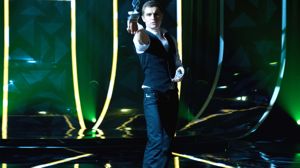When people marvel at movie magic, it's not usually card tricks caught on film. But that's exactly what we get in the very first scene of Now You See Me: a point-of-view illusion. The audience is told to pick a card from a shuffling deck, and, moments later, a card lights up a skyscraper in the background. Sure enough, it was the card I had committed to memory (along, I suppose, with 90% of the audience).
This impressive feat that you helped to orchestrate was a perfect hook, even if, afterwards, all the other illusions suffer predictably from…well, the standard movie magic.
But who cares. Now You See Me is definitely a fun movie. It's fast, witty, slick, and satisfying. The script takes as much pride in revealing secrets as it does in trying to trick the audience, and that's exactly what makes spectacle work on the big screen--and the Vegas stage. Just ask David Copperfield, the man whose magic (according to the closing credits) "inspired" the film.
Your role, David, was therefore probably much like Thaddeus Bradley (Morgan Freeman) in the film: a former magician who makes a living selling trade secrets. Thaddeus is recruited by mystified FBI Agent Dylan Rhodes (Mark Ruffalo) when The Four Horsemen (Jesse Eisenberg, Woody Harrelson, Ilsa Fisher, and Dave Franco) shower an audience with three million Euros stolen from a French bank during one of their shows. They welcome the publicity that accompanies their subsequent arrest, with Eisenberg's character proclaiming that if the process goes any further, the FBI will essentially be forced to "believe in magic at an institutional level". And so they're set free, while Thaddeus proceeds to unravel their elaborate crime (albeit without the required proof). And soon we're on to the next show, which is much less mystical, but rife with consequence. Once again, as quickly as the process of their deception is revealed, the story is a few steps ahead in setting up the third and final climactic trick.
The pacing and quick character introductions do an effective job of drawing us in as the film unfolds. Of course, like all good magic, much of it is misdirection. Being shown "how" something happened certainly satisfies our immediate curiosity, but this puzzle-piecing is also done at the determent of developing our central characters.
The individual skill sets of The Four Horsemen (mentalism, slight-of-hand, theatrical illusions, street magic) and their relationship to one another is overshadowed by a police pursuit midway through the film. But by the end we understand that even this seemingly devaluating approach is foregrounded by design.
So I suppose it's a credit to the early character work that, by the end, I wanted more than just the clever "how they did it" explanations. But I was entertained. I was surprised and impressed by the final result. And that's the true definition of magic--movie or otherwise.
Sincerely,

Christopher







